Bila Tserkva’s “Legal Unity”: from legal aid to strategizing for the future
Publication date: November 4, 2025
Author: Yulia Bilyk, Communications Manager, Legal Development Network
Legal Unity is a member organization of the Legal Development Network based in Bila Tserkva, Kyiv region. It provides free legal aid, conducts legal awareness events, assists newly established civil society organizations and IDP councils, and, most importantly, creates a space where people feel cared for and supported. Thanks to flexible funding from GlobalGiving, the organization continues to fulfill its mission despite the challenges caused by the closure of USAID programs and the growing humanitarian crisis in communities.
Legal aid and social support
Legal Unity receives citizens three days a week at the organization’s office and twice a week at the IDP Support Center. In addition, people can contact them by phone or via messengers.
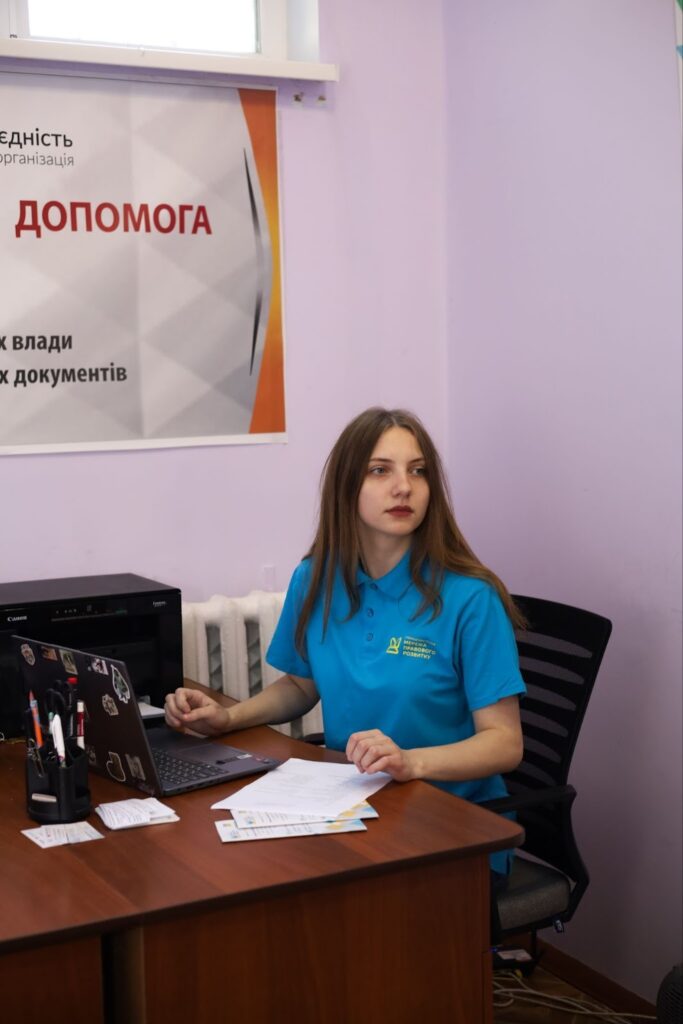
“Currently, we provide consultations three days a week at the NGO’s office and twice a week at the IDP Support Center. We also accept requests by phone and via instant messengers. On average, we receive 90 people per month,” says Oleksandra Shcherbina, head of the NGO Legal Unity.
The uniqueness of the organization lies in the fact that it provides not only legal but also social support. Two heads of IDP councils — the Bila Tserkva community and the Bila Tserkva district — are involved in the work. Together, they ensure constant communication with IDPs via Viber chat.
“The head of the Bilotserkivska IDP Council has a Viber chat with over 3,000 IDP participants. Thanks to this well-established partnership, we use it to share info about the office’s schedule, legal needs, sociological surveys, and other announcements,” explains Oleksandra Shcherbina.
Social support means that the organization helps people navigate the assistance system: it refers them to the Social Services Center (especially families with children who find themselves in difficult circumstances), the Employment Center, the Pension Fund, and city council members. At the same time, the outcome is always monitored: whether people have managed to resolve their issues or whether they need further assistance.
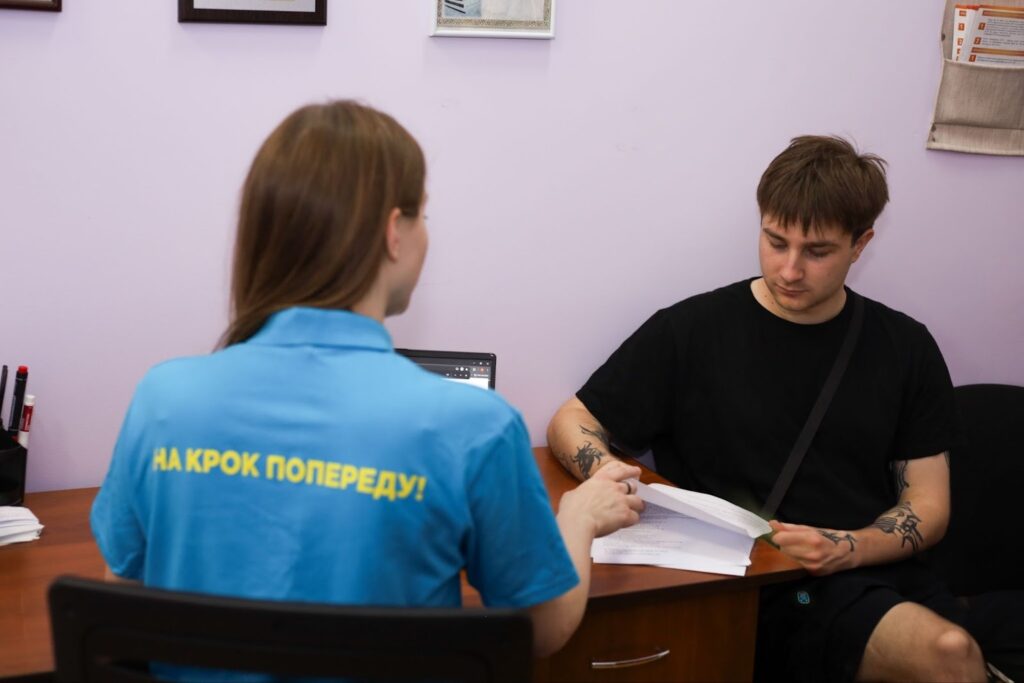
Humanitarian crisis: back to the realities of 2022
After the start of full-scale war, humanitarian aid became a new challenge for the organization. While 2023 saw a lull, as there was sufficient humanitarian aid, the situation is now escalating again.
“In fact, we have returned to 2022, when the issue of humanitarian assistance in communities was extremely acute. Every second person with IDP status is seeking humanitarian aid. Among the most pressing needs are food, heaters, blankets, mattresses, and clothing,” says Oleksandra Shcherbina.
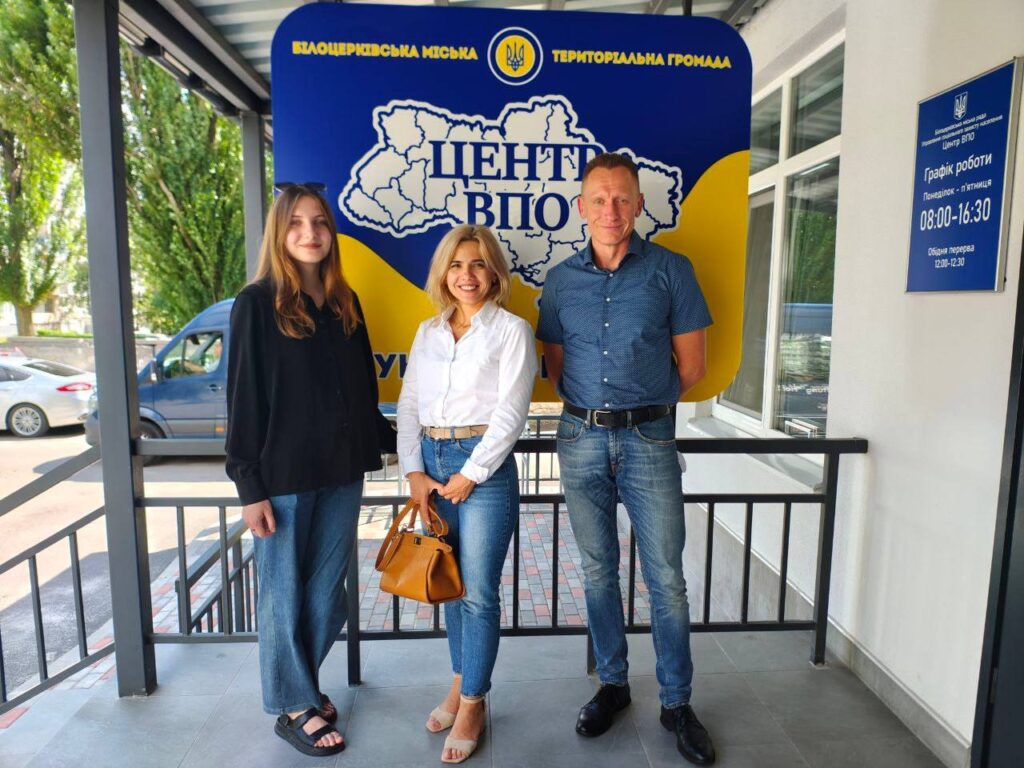
She emphasizes that one of the most difficult problems is finding partner organizations that can provide the necessary humanitarian aid. Currently, there is only one organization in Bila Tserkva that provides food aid, so there is a catastrophic shortage.
The housing situation in the community is also alarming. During the conversation, Oleksandra shares real stories that make you think:
“In our city, there are landlords who have a three-room apartment, bring in many single beds and sofas, and charge people literally 4-5 thousand hryvnias per month for a place to sleep. Up to 7-8 displaced persons can live in such accommodation. They spend the night there, and during the day the landlords simply kick them out onto the street. Most of the displaced persons are unemployed pensioners. Given the current weather conditions, it is difficult for me to imagine how people will continue to live.”
Survey on housing problems of IDPs
To understand the scale of the housing crisis and bring the problem to the attention of the authorities, the organization developed a sociological survey entitled “Solving the housing problems of IDPs.” They worked on it for over two months and even exceeded their own expectations.
“We were aiming for 200 people to take part in the survey. But within the first few days of launching the online questionnaire, 264 respondents had already answered the questions. We also distributed paper copies of the questionnaire among our partners. We were surprised that internally displaced persons from our community were very active in participating in the survey. It is clear that this topic is important to them, and that they appreciate that we are asking questions and taking an interest in their housing problems,” says Oleksandra Shcherbina.
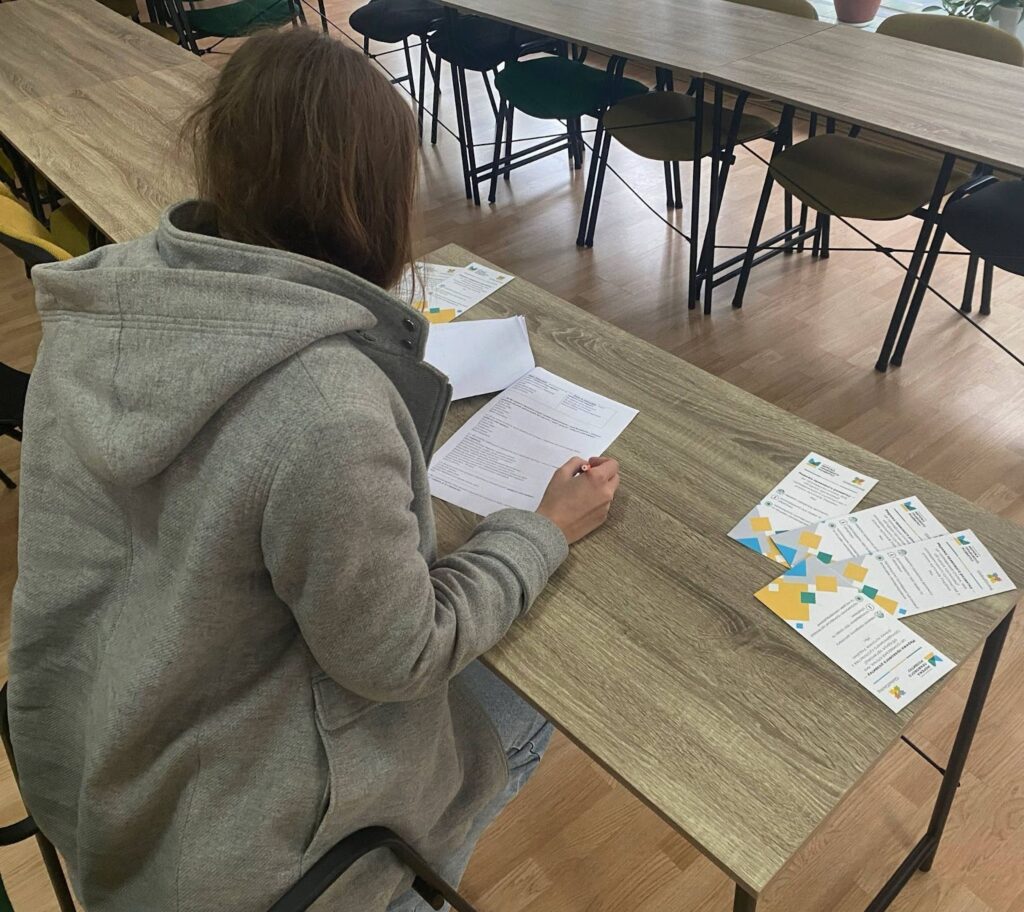
In November, the organization plans to hold a forum for civil society organizations in the Kyiv region, where it will present the results of its sociological survey.
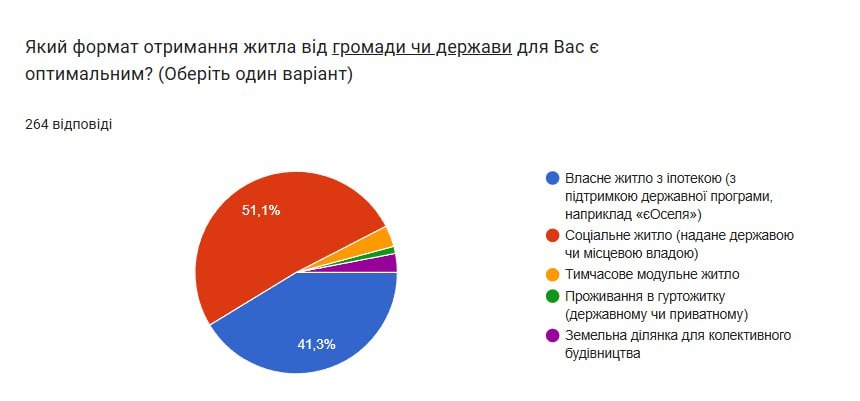

Roadmap for IDPs
Another important tool for supporting displaced persons is the Roadmap for IDPs in the Bilotserkivska community, developed in collaboration with representatives of 12 different agencies and services. This document serves as a first point of reference for IDPs in their new location.
“We spent a long time figuring out what issues are relevant to displaced persons so that we could then convey the necessary information to people. After all, the main thing is that the information is people-centered and accessible to everyone,” explains Oleksandra Shcherbina.

While developing the roadmap, the team consulted with regular visitors to their office from among displaced persons to check with them the convenience of submitting and accessing information.
“We have regular clients among IDPs, and on several occasions while we were working on the roadmap, I asked them: please take a look at our work and tell us if everything is clear to you, if there is enough information, if this is the information you need. And people responded with great enthusiasm; they were happy to be involved in the process of creating something small but quite important,” emphasizes Oleksandra Shcherbina.
According to Oleksandra Shcherbina, about 10 new people register every day at the Bila Tserkva IDP Support Center, which means at least 200 people per month. Therefore, the roadmap is in high demand.
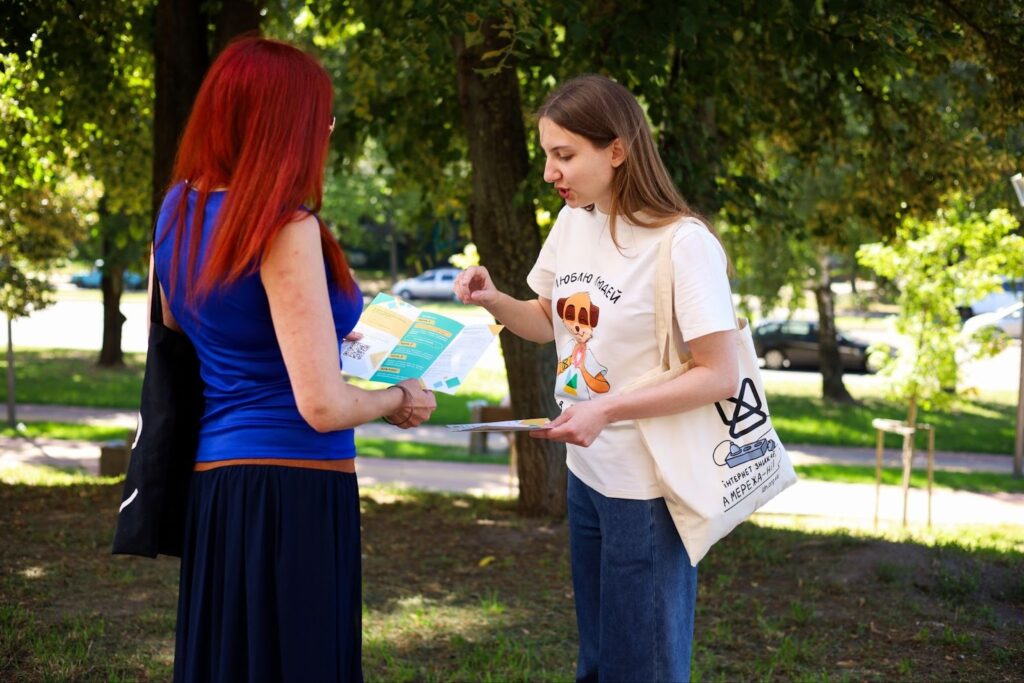
Volunteer team: young people eager to gain experience
The Legal League NGO team is currently small. It consists of the organization’s chairperson and lawyer, as well as eight volunteers—students of the law faculty of the Bila Tserkva National Agrarian University. Oleksandra Shcherbina trains the volunteers, tells them about her own experience, and, together with the Center for Free Secondary Legal Aid, organizes thematic events, thereby preparing future specialists for the human rights movement.
The students are involved in conducting surveys at mobile outreach points, receiving citizens, and helping to maintain communication with target audiences.
“Of the eight volunteers, one has been working with us for about two years, three volunteers have been with us for a year, and four more joined us in early September 2025. They are all proactive and want to do more. We are proud of them,” says Oleksandra Shcherbina.
Support for IDP councils and networking
Thanks to flexible funding from GlobalGiving, the organization provides expert advisory support to two IDP councils — the Bila Tserkva district council and the community council. In particular, the NGO is involved in developing council strategies and work plans, and helps councils build partnerships with local authorities.
“The authorities of the Bila Tserkva district do not understand how an IDP council should be organized: what its purpose is, its sources of funding, its team, and what tasks can be assigned to it. The council itself asked us to help with the re-election of its chair, which will take place in December. They have also asked us to help them develop a strategy for 2026,” says Oleksandra Shcherbina.
In addition, the organization is actively working to network civil society organizations in the city and region, understanding that after the closure of USAID programs, many organizations were left without support.
“In the second part of the CSO forum in November, we plan to set aside time for networking so that all interested parties can understand which organizations are working in our city, what they do, whether they have any funding at all, and what kind of assistance they need,” says Oleksandra Shcherbina.
Challenges and prospects
The suspension of USAID grant programs has significantly affected the capacity of Legal Unity itself. Previously, it was possible to travel to surrounding villages to provide their residents with access to free legal aid, but now this is no longer possible. The NGO’s office is only open three days a week for four hours, instead of the previous five days from 10 a.m. to 5 p.m.

“We continue to conduct legal awareness activities as usual. However, as was the case before, we are unable to conduct training sessions for internally displaced persons at their request and engage experts for this purpose,” says Oleksandra Shcherbina.
Despite these difficulties, the team is not giving up. Oleksandra emphasizes that she sees in her organization the level of expertise and resources necessary to take less experienced local organizations under its wing, bring them together, and join forces with them to help people.
The most important thing for Oleksandra Shcherbina and her team is feedback: when clients return in five years and ask for help again, when they say they feel heard, when they know that in critical situations they have someone to turn to.
“The immediate challenge for our community is to get through the winter. People know us, they hear stories about how we have helped someone, but at the same time they often come to us with problems that, unfortunately, we cannot solve. We see how psychologically exhausted people are right now. That is why, for our part, we are doing everything possible to let them know that there is support, that there are people who are ready to listen and help if possible,” concludes Oleksandra Shcherbina.
The material was created by the Legal Development Network with the support of the international charitable platform GlobalGiving. The content of this publication is the sole responsibility of the Legal Development Network.
|
Отримайте поглиблену консультацію через чатбот LawLink
|
P. S. In June 2024, the Legal Development Network (LDN) launched a crowdfunding campaign, Recovery of The South of Ukraine , as part of the crisis response program #StandWithUkraine.
You can Recovery of The South of Ukraine |
If you have notices an error on the web-site, please, highlight the text and press ctrl-enter.
Have you found your solution? Help others!
Print a poster
Print and place the Network's poster on a notice board in your entrance hall
Become a volunteer
Become a volunteer and assist others in finding problem solutions
Do you need a consultation ?
Online chat
Ask question and one of the LDN's lawyers
will answer it.
Chat's schedule: from 10 to 16
every day
Chatbot
Ask questions via LawLink Bot in any convenient way. LawLink Bot is a smart and digital legal assistant created by the Legal Development Network.

Our initiatives
The Legal Development Network implements comprehensive projects aimed at strengthening human rights, developing capable communities, and building sustainable tools for access to legal aid. We work at the intersection of advocacy, legal education, and local coordination of humanitarian response.
